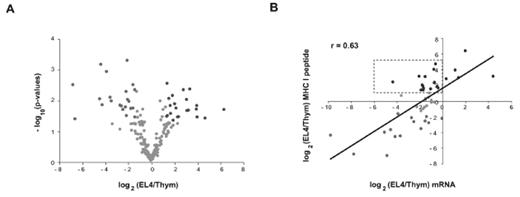Abstract
Background: Cell surface MHC I molecules are associated with self peptides that are collectively referred to as the self MHC I immunopeptidome (sMII). The sMII plays vital roles: it shapes the repertoire of developing thymocytes, transmits survival signals to mature CD8 T cells, amplifies responses against intracellular pathogens, allows immunosurveillance of neoplastic cells, and influences mating preferences in mice. Despite the tremendous importance of the sMII, very little is known on its genesis and molecular composition.
Methodology/Principal Findings: We developed a novel high-throughput mass spectrometry approach that yields an accurate definition of the nature and relative abundance of unlabeled peptides presented by MHC I molecules. Two major points emerged from a comprehensive analysis of the sMII of primary mouse thymocytes:
the sMII is enriched in peptides derived from highly abundant transcripts; and
the sMII conceals a tissue-specific signature that emanates from about 17% of genes represented in the sMII.
We found that about 25% of MHC I-associated peptides were differentially expressed on normal versus neoplastic thymocytes. Remarkably, about half of those peptides derived from molecules implicated in neoplastic transformation. Integration of peptidomic and transcriptomic data unveiled that, in most cases, overexpression of MHC I peptides on cancer cells entailed posttranscriptional mechanisms. Finally, mice immunized against peptides overexpressed by 10 to ≥ 85 fold on cancer cells generated specific cytotoxic T-cell responses against malignant cells endogenously expressing the target epitope.
Conclusion: High-throughput analysis and sequencing of MHC I-associated peptides yields unique insights into the genesis of the sMII in normal and neoplastic cells, and can be used to discover peptide targets for cancer immunotherapy. Furthermore, global portrayal of the sMII offers a novel perspective into how neoplastic transformation affects protein metabolism.
Relative Quantification of Differentially Expressed MHC I peptides and Source mRNAs from Thymocytes and EL4 Cells (A) Volcano Plot representation illustrate MHC I peptides reproducibly detected across biological replicates (n = 3). Peptides over- and underexpressed on EL4 cells relative to thymocytes (p-values≤0.05; fold change ≥ 2.5) were highlighted in blue and red, respectively. MS-MS spectra of circled peptides are shown in B and C. B) Scatter plot shows the correlation between relative expression of mRNA and that of MHC I peptide. Expression ratios for source mRNA (x axis) and MHC I peptide (y axis) between EL4 cells and thymocytes were plotted on a log 2 scale for 47 pairs. A Spearman correlation coefficient was calculated from the linear regression. MHC I peptides overexpressed in EL4 cells or normal thymocytes are highlighted in blue and red, respectively; peptides that were not differentially expressed are in grey. Dashed box includes peptides whose overexpression on EL4 cells did not correlated with increased mRNA levels of their source protein.
Relative Quantification of Differentially Expressed MHC I peptides and Source mRNAs from Thymocytes and EL4 Cells (A) Volcano Plot representation illustrate MHC I peptides reproducibly detected across biological replicates (n = 3). Peptides over- and underexpressed on EL4 cells relative to thymocytes (p-values≤0.05; fold change ≥ 2.5) were highlighted in blue and red, respectively. MS-MS spectra of circled peptides are shown in B and C. B) Scatter plot shows the correlation between relative expression of mRNA and that of MHC I peptide. Expression ratios for source mRNA (x axis) and MHC I peptide (y axis) between EL4 cells and thymocytes were plotted on a log 2 scale for 47 pairs. A Spearman correlation coefficient was calculated from the linear regression. MHC I peptides overexpressed in EL4 cells or normal thymocytes are highlighted in blue and red, respectively; peptides that were not differentially expressed are in grey. Dashed box includes peptides whose overexpression on EL4 cells did not correlated with increased mRNA levels of their source protein.
Author notes
Disclosure: No relevant conflicts of interest to declare.


This feature is available to Subscribers Only
Sign In or Create an Account Close Modal